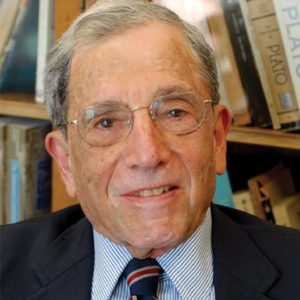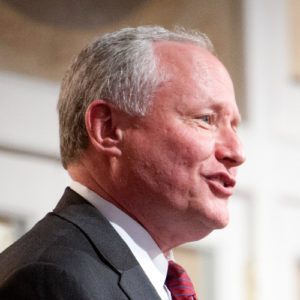American Political Thought
Engage key texts that have helped shape the political idea – and political ideals – of America.
Summer 2013
Washington, DC
The series of newspaper essays collectively known as The Federalist are rightly regarded as classics of American political thought. Standing alone, however, they are only one half of a notable conversation. We will try to uncover the differing presuppositions, hopes, and fears of those who debated whether to replace the existing Articles of Confederation with the proposed Constitution of the United States.
Images: Albert Herter, Signing of the American Constitution, mural, 1916 | Junius Brutus Stearns, Washington at Constitutional Convention of 1787, oil on canvas, 1856
Ralph Lerner on liberty in the Declaration of Independence

Ralph Lerner is the Benjamin Franklin Professor Emeritus in the College and professor emeritus in the Committee on Social Thought at the University of Chicago. He is the author, most recently, of Naïve Readings: Reveilles Political and Philosophic (University of Chicago Press).

Ralph Lerner is the Benjamin Franklin Professor Emeritus in the College and Professor Emeritus in the Committee on Social Thought at the University of Chicago.
His books include The Founders’ Constitution (co-edited with Philip B. Kurland), The Thinking Revolutionary: Principle and Practice in the New Republic, Revolutions Revisited: Two Faces of the Politics of Enlightenment, and Maimonides’ Empire of Light: Popular Enlightenment in an Age of Belief. He is the author, most recently, of Naïve Readings: Reveilles Political and Philosophic.
He attended public school in Chicago, received his degrees in political science at the University of Chicago, and had a year of post-graduate study of medieval Hebrew at the University of Cambridge. He has served in the U.S. Army. All of his teaching has been at the University of Chicago, apart from visiting appointments at Stanford, Cornell, and Harvard universities and a visiting lectureship at the Institut Raymond Aron. He has received fellowship awards from the Rockefeller Foundation and the National Humanities Center. He has received a Quantrell Award for excellence in undergraduate teaching.
Readings:
Discussion Questions:
Readings:
Discussion Questions:
Readings:
Discussion Questions:
Readings:
Discussion Questions:

Darren Staloff
Darren Staloff is a retired Professor of History from the City College of New York and the Graduate Center of CUNY. Professor Staloff has published numerous papers and reviews on the subject of early American history.

William Kristol
William Kristol is editor at large of The Weekly Standard, which, together with Fred Barnes and John Podhoretz, he founded in 1995. Mr. Kristol has served as chief of staff to the Vice President of the United States and to the Secretary of Education. Before coming to Washington in 1985, Kristol taught politics at the University of Pennsylvania and Harvard’s Kennedy School of Government.

Adam J. White
Adam J. White is the Laurence H. Silberman Chair in Constitutional Governance and senior fellow at the American Enterprise Institute, where he focuses on the Supreme Court and the administrative state. Concurrently, he codirects the Antonin Scalia Law School’s C. Boyden Gray Center for the Study of the Administrative State.

Matthew Continetti
Matthew Continetti is the director of domestic policy studies and the inaugural Patrick and Charlene Neal Chair in American Prosperity at the American Enterprise Institute (AEI), where his work is focused on American political thought and history, with a particular focus on the development of the Republican Party and the American conservative movement in the 20th century.

Daniel DiSalvo
Daniel DiSalvo is a Senior Fellow at the Manhattan Institute’s Center for State and Local Leadership and an Assistant Professor of Political Science at The City College of New York-CUNY. His scholarship focuses on American political parties, elections, labor unions, state government, and public policy.